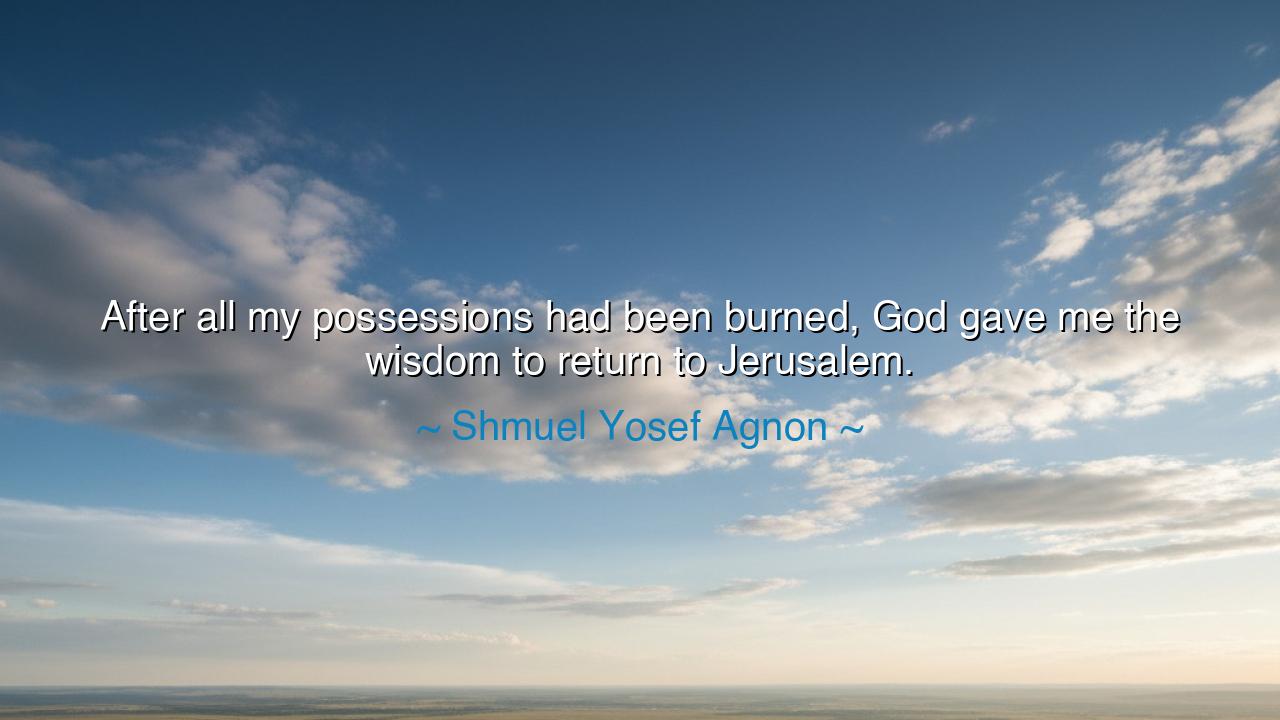
After all my possessions had been burned, God gave me the wisdom
After all my possessions had been burned, God gave me the wisdom to return to Jerusalem.






Hearken, children of the ages, to the solemn words of Shmuel Yosef Agnon, who declared: “After all my possessions had been burned, God gave me the wisdom to return to Jerusalem.” In this utterance lies the eternal truth of loss, divine guidance, and the resilience of the spirit. Agnon reveals that when the worldly treasures of life are consumed by fire—whether literal or symbolic—the soul is called to seek that which is eternal: faith, wisdom, and the sacred center of being. True guidance emerges when all else has fallen away.
Agnon teaches that wisdom is born of suffering and loss. When possessions, security, or familiar comforts are stripped from the mortal, the mind and heart are laid bare, receptive to divine insight. It is only in the crucible of adversity that one can perceive the path set by providence, the call to return to that which is holy, enduring, and sustaining. Jerusalem, in this sacred reflection, becomes both a place and a symbol of spiritual renewal, a homeland of the soul rather than mere geography.
Consider the tale of King David, who faced exile, betrayal, and the destruction of his kingdom. Yet, in his wanderings and tribulations, he received insight and courage from the Almighty, guiding him to reclaim his city, his people, and his purpose. Like Agnon, David demonstrates that loss is not the end, but a portal through which divine wisdom may illuminate the path to restoration, renewal, and sacred duty.
The ancients themselves understood that material wealth is fleeting, but spiritual treasures endure. The philosophers of Greece, the sages of Israel, and the mystics of the East all taught that the soul must be ready to relinquish the temporal in order to grasp the eternal. Agnon’s words echo this teaching: the destruction of possessions is not ruin, but preparation, a clearing of the field so that wisdom and faith may take root and flourish.
Thus, his reflection is both admonition and hope: when all that is temporal is swept away, turn not to despair, but to that which endures beyond fire and loss. Seek the guidance of God, the insight of the spirit, and the place—literal or symbolic—where your soul may be renewed. In such return lies the greatest restoration, for the wisdom of providence outweighs all earthly wealth.
Carry this teaching, children of generations yet unborn: embrace the trials of loss, heed the wisdom granted in adversity, and return to the sacred centers of your being. For in divine guidance, in faith, and in the pursuit of that which is eternal, the spirit finds strength, purpose, and treasures no fire can consume.






TAPham Tuyet Anh
I see a profound interplay between faith and wisdom here. Agnon’s words suggest that wisdom isn’t intellectual but spiritual insight granted through grace. It makes me think about the power of place—Jerusalem as both a physical and symbolic return to faith, identity, and home. But it also raises a question: was wisdom the gift, or was it faith that made him recognize it as such? Maybe they’re inseparable in moments of divine revelation.
DPdat2010 phamvantien
There’s a quiet resilience in this statement that really moves me. It feels like Agnon is describing a transformation—from despair to divine purpose. Losing everything would break most people, yet he interprets it as guidance. I wonder how many of us could see tragedy as a spiritual turning point rather than just loss. Maybe wisdom isn’t about knowing answers but trusting that even devastation can lead us back to something sacred.
QNQuynh Nguyen
This line strikes me as deeply symbolic. The burning of possessions could represent not just physical loss but a spiritual cleansing—removing attachments to reveal what truly matters. I admire the idea that wisdom can emerge from ruin, but it also makes me question: must we always endure pain to reach understanding? Perhaps Agnon’s journey shows that wisdom isn’t granted in comfort, but in surrender and the courage to start anew.
MNtran my ngoc
I find this reflection both heartbreaking and inspiring. It’s as if Agnon is saying that true wisdom often comes only after destruction. When everything external is taken away, what remains is a call to something eternal. I can’t help but think about how faith can turn suffering into clarity. But I also wonder—was it faith alone that drew him back to Jerusalem, or the human need to rebuild meaning after devastation?
NBNam Bao
This quote feels profoundly spiritual. It suggests that sometimes loss is the very thing that clears the path toward purpose or faith. I wonder if Agnon saw his misfortune as divine redirection rather than punishment. It’s interesting how tragedy can strip away material comfort but reveal deeper meaning. Was his return to Jerusalem an act of obedience, healing, or destiny? Maybe wisdom itself is born from accepting that loss can guide renewal.